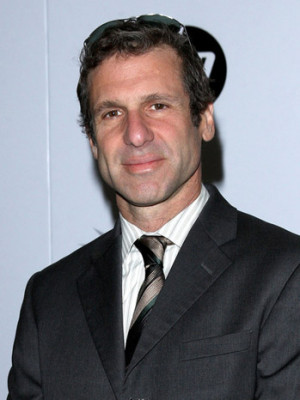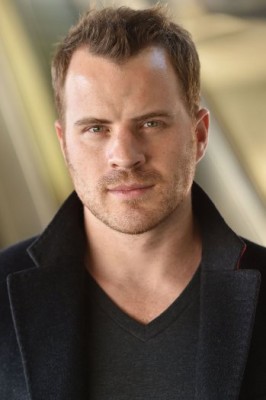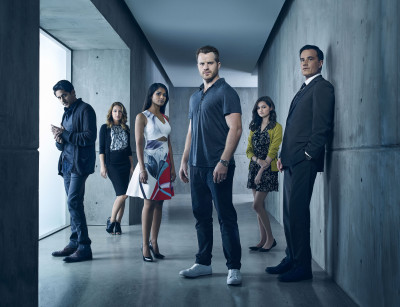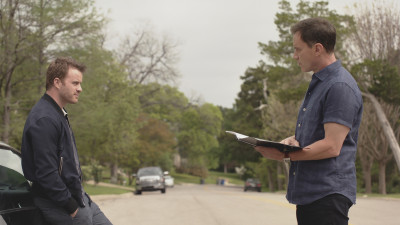

Fox’s Second Chance (Wednesdays, 9/8C), which premieres tomorrow night, follows Jimmy Pritchard a former Seattle sheriff forced to retire because of his extralegal methods, who is killed in a break-in and resurrected by a brother/sister team of scientists in hopes of curing the sister’s cancer. The revived Jimmy is rejuvenated – Jimmy in his prime (early thirties) – and at the absolute peak of physical human perfection.
The series was created by Rand Ravich (above left) and stars Rob Kazinsky as the rejuvenated Jimmy. Late last week, both men took time from their busy schedules to talk with a group of journalists/bloggers about the show.
Good afternoon, and thank you both for doing this call.
Rob Kazinsky: Thank you. Good morning..
First of all, I wanted to ask, what actually connects you to this character, Rob, and what did you find about Jimmy that you found so fascinating and that gives you an in to playing him?
Rob: Well, when I read the script—I only read two good pilot scripts in pilot season, and this was one of them. This character was very—I’m not your typical 32 year-old guy. I’m kind of grumpy and cantankerous and a bit weary myself, so there was an element of it just feeling kind of right in my soul.
Then I looked at this guy, and I thought my father’s this age, and my father is pretty, pretty close to Jimmy Pritchard in a lot of ways, so there was an opportunity to play this grumpy side of myself and represent my father on screen and how my father would react to all these things and the out-of-date mannerisms which have kind of died with the modern philosophization of manners. There was a time when men were gentlemen, and they stood when their lady entered the room, and they did things the right way before politicians and lawyers and social media got involved and Jezebel got involved with what is socially right and wrong.
Once upon a time, you just knew what was right and wrong. There was an element of this old-timey justice bringer, this old-timey family man, this guy who just is indicative of everything that once made a man, and putting him in this now defunct time period of today, there’s something really intriguing about that, something really heart-warming about it. It’s nice to sit there and say hey, you can be a gentleman again.
That makes sense. Then I have a followup for (Rand). I wanted to know, basically, you’re writing for a young character and an old character. Do you view it that way? Do you look at it as two different characters playing the same person?
Rand Ravich: No, I look at it as an old man being reborn in a young man’s body. It’s always, for us, I think for Rob and for myself, with me writing and Rob acting, it’s always one character. It’s Pritchard, he’s looking out through new eyes, but he is re-entering the world because he—when he checked out of the world 15 years ago and shuffled off to his Barcalounger to end his days, he had stopped growing and stopped being part of the world, but now he’s re-entered.
But he is that person, so he has to learn all these things again. Only his body is young. His attitudes have been formed, like all ours have, and are pretty rigid and take a beating as he re-enters the world. He is not ready for 2016. It’s one guy down there, one guy who is changing, but one guy.
I’m actually with FOX Social, and our fans are very excited about this show. We did release a preview for the pilot, so we’ve actually sourced some fan questions, so if you wouldn’t mind answering. One fan had asked, directed to you, Rob, what was your inspiration to become an actor?
Rob: Oh my God, that—
I know it’s a long-winded question.
Rob: Really long, long, long-winded question. It would take, really, a long, long time to explain. I’ll try and sum it up into a couple of sentences. There’s only two things I’m good at in the world, and acting isn’t one of them, but for some reason, people keep giving me chances, second chances.
It was never on the agenda for me to do this. It was always just—I love film and I love storytelling. To sum it up as shortly as humanly possible—God impossible question. To sum it up as shortly as humanly possible, it was the only thing that really inspired me in life was film and TV and telling a great story. I’m just very lucky that I get to do it.
Great. Thank you.
Rob: Any more?

SECOND CHANCE: L-R: Adhir Kalyan, Vanessa Lengies, Dilshad Vadsaria, Rob Kazinsky, Ciara Bravo and Tim DeKay. SECOND CHANCE premieres Wednesday, Jan. 13 (9:00-10:00 PM ET/PT) on FOX. ©2015 Fox Broadcasting Co. Cr: Justin Stephens/FOX
There’s an interesting one; it is from one of our fans and he had asked, do you think the world—I guess it could be open to both of you—do you think the world would be better if everyone could be brought back to life and have a second chance?
Rob: Rand?
Rand: I don’t know if the world be better. I’m not sure it could be worse, but the thing, just to spin it towards this character, is that Jimmy Pritchard didn’t—what we love about this character is that he did not ask for a second chance. I’ve read a lot of stories where somebody says if only I could do it one more time. This guy liked his life. He liked being an old curmudgeon. He had basically given the finger to the world that I’m done with you, and that’s the guy that was dragged back practically kicking and screaming to this second chance. That’s what we love about this character is that he did not ask for it; it came to him.
Rob: There’s this whole nature versus nurture thing as well. If you brought people back, they wouldn’t be different people, and that’s what Jimmy messes with as well. He has all these other opportunities in his new life, but people are still people.
Rand: Right.
Rob: He’s still prone to the same desires, the same needs, the same fallibilities. If you brought everybody back into an already over-populated world, there’d just be a queue of people lining up to kick Hitler in the nuts.
Rand: Right. It’s that thing when you say I wouldn’t make those mistakes again, you probably won’t; you’re just going to make all different ones, which is what we love about the character, too. He’s very far from perfect and his trying and failing as he gets this second chance is what makes him so lovable and interesting.
Rob, I was wondering if you were going to be live tweeting the premiere of the show because you are such a big part of social media.
Rob: Am I?
Rand: Rob, you’re a huge tweeter.
Rob: I’m a huge tweeter. I tweet once every four or five days, usually about cats or dogs. I haven’t—it’s not something I’m good at, and it’s not something I know if I can do or not. I imagine I will be hiding under a couch every Wednesday at nine, in fear of reprisals. Live tweeting, I don’t know if that’s something I should be trusted to do, more than anything else.
Did you have to do anything physically to get into the mindset of this character, to get into his body in order to embody him?
Rob: Well, I’ve been a fighter most of life, lots of boxing and jiu-jitsu and lots of stunt work, lots of injuries. I’d say my body isn’t far off of a 75 year-old man’s body. Even yesterday, I woke up and I couldn’t move my head at all. I think my physicality fits quite nicely with an old man.
Rand: In your favor, in this technological world where people are just pushing buttons, Rob has a tremendous physicality that the old man Jimmy Pritchard’s lived a life on the street and was dealing with people and putting his hands on people. Rob has that physicality of an animal, a real person out in the world, which is very gratifying for the character. It works very well for it.
Rob: Thank you, Rand. You just saved my a**.
Rand, what do you think it is about the show that’s really going to draw in so many viewers?
Rand: I think there are a lot of moving parts to the show, and I think there’s a lot of really interesting questions to ask and characters are going into, but the fundamental element which weirdly enough is how we ended up with our final and best title is the thing that everyone thinks about, from the kindergarten playground on, if only I had a chance to do that better. It’s driving home from every party. It’s when you get out of class or a marriage or a relationship or any experience, what could I—God, I wish I had been there and could do it again.
So, the idea of a second chance, the idea to go back and repair what you’ve done to your family and what you’ve done to your town and watching the unintended consequences ripple out of what you didn’t expect to happen this time, I think, because that’s a question everybody asks, and the specificity of the second chance in relation to family—I wish I had a second chance with my family, with my son, with my daughter. I think that is questions, I think, we’ve all asked, consciously or unconsciously. I think that’s what’s going to draw people in.
Plus, Rob is just smoking hot.
Rob: Smoking hot. Smoking hot.
Rob, I was just wondering how difficult is the American accent for you to do, or is it fun, or is it challenging? I was just wondering what your take is on that.
Rob: I’d love to see Rand’s face right now. The American accent is a permanent barrier. It’s a struggle to fight with, and it’s something I’ve never really had to do before. You develop a line of skills in your life to make this job work, and then suddenly there’s this whole new element to stand between you and finding the realism of it. That’s one of the great challenges of this job so far, for me, has been finding this character and how to make him a human being when there is this barrier, the things you instinctively want to say in your own voice and then filtering it through this augmented voice into this different accent. It’s almost a whole new character in itself.
There’s been a whole voyage of discovery for me of finding new ways of saying things and new ways of being and what an accent informs in terms of physicality and in terms of repetition and in terms of mannerisms and habits. There’s been ups and downs with it, and only you and the viewers will be able to tell me how successful I was. It’s been a challenge but one that I’ve actually enjoyed 90% of the time.

SECOND CHANCE premieres on FOX. Pictured L-R: Rob Kazinsky and Tim DeKay. ©2015 Fox Broadcasting Co. Cr: FOX
Rand, I was wondering, of course, the series really features Jimmy, Rob as Jimmy, but you’ve got a really interesting group of supporting players, too. Is there one that you really like writing for and that you hope the audience really catches on to?
Rand: I do like—they are so diverse. He was brought back in a science fiction landscape, but he is this man who has been sheriff of Seattle and lives on the streets as a sheriff all those years. I am writing for characters from these two distinct worlds.
The character of Jimmy Pritchard is the most fun to write because he is the fish out of water. He is a hands-on, rough-and-tumble guy from another time who is thrust into this technological landscape of 2016. He is the most fun because it’s his viewpoint that’s so different from everybody else’s.
Diametrically opposed to that, the character of Duval, who plays his son, is an every man. When you watch the show through his eyes, it’s holy s**t, my father who I had this tremendously problematic relationship with, is now back, younger than me, more handsome, and he cures cancer. To be with an everyman and watching the world unfold through Duval’s eyes is from a different point of view, but it is equally as interesting.
Those two, those characters are the engine that drive the show, and they are incredibly interesting to write for.
Rob: Don’t tell Tim that you said I was more handsome than him.
Also, Rob, did you ever meet with Philip Baker Hall to look at how his characteristics are and everything?
Rob: Not before we shot the pilot. We weren’t going to be able to get together before we actually started shooting. My research of him just consisted of watching all his movies, which, by the way, takes about seven years to do because he’s done so many.
There was a lot of watching him and trying to mimic his manner of speaking and his delivery, and then when he was filming on set and the pilot, I would go and watch what he was doing and see the filming and then speak to—[Audio disruption.]… were very helpful in the pilot when they—because I would sit down and talk to them and say, so how does it feel working with him? How does it feel when I’m working with you? What can I do to make it feel similar? There was a voyage of discovery, certainly, in the first couple of episodes of staying with it, but then obviously at some point, I had to evolve beyond that as well and was able to make him slightly more myself, I imagine.
Rob, what is your character’s greatest weakness and strength?
Rob: Both, one in the same, they’re the person that he is. There’s the experience of his life which has led him to—that’s his greatest strength, the way that he understands people and views—he can read situations, read people. His desires and his wants give him a certain strength, but then at the same time they are deep-seated negatives that detract from him being a decent person at times. The dichotomy of most human beings is that nobody’s perfect. So, his great strengths are also his big weaknesses.
What is the best part of filming the show?
Rob: I’d probably say Tim DeKay is, for me. Rand writes these two great characters, and Tim and I get to have a really good time playing with them. Tim and I have developed a very good working relationship based on a lot of trust and mutual respect. Coming in to work with Tim every day has made my job an awful lot easier. His enormous experience has helped me find my character easier and make just working as hard as we’re working every day just that little bit easier.
The car that you’re driving that they see in the promos, what kind is it? Did you have fun driving it?
Rob: Correct me if I’m wrong, but it’s a ’72 Buick Riviera. Might be wrong on the year. Rand probably knows for sure.
Rand: I think it’s a ’71 but close enough.
Rob: ‘71. I was way off. Yes, so it’s a ’71 Buick Riviera, which looks amazing. It really does look amazing, but yet it’s awful. It’s like driving a boat in stormy weather. It has very little power, very little steering, it drifts, and I blew one up in the pilot. Like most classic cars, it’s a grumpy, old, out of its time, not-up-to-date mess, just like Jimmy Pritchard. So, it’s a perfect car.
Rand, I was just wondering how long do you have Philip Baker Hall for? Is he going to be recurring throughout the series run or is it a limited time involvement?
Rand: Philip is a character—Philip comes and goes throughout the first season. He’s not in all episodes produced, but he is in a good portion of the first half of the first season.
Terrific. What’s it like having him speak your words?
Rand: It’s a dream. One of the things in this business you just have to be grateful for is the people who you admired only from the theater seat are now speaking your words and bringing them to life. It’s one of those things you have to be thankful for.
Rob, there are some elements of the super hero to the rejuvenated Jimmy, and I was just wondering what’s the best part of playing the enhanced Jimmy and what’s the worst?
Rob: Interesting. I’d say, the best thing about his enhanced powers is that they’re not ridiculous. I’m not (audio disruption). They’re just essentially about the idea of what we could all be if we were at our best. Everybody has the capability of doing exceptional things physically if you were just—if you spent your life running, you’d be a great runner. If you spend your life lifting, you’d be very strong.
We’re not talking about Superman here. We’re talking about the best that a human being can be. The realism of that, that kind of —I really refrain using the term superpowers. It’s just his power. It’s just who he is, and it’s just what any really—not much more beyond what any human being could do if they were at their absolute utmost.
The worst thing about that is that I don’t lift up any cars or jump tall building or fly because those are things that are definitely on my bucket list to do.
Terrific. Thanks so much.
Rand: I’ve got to get back to set. Thank you very much.
Rob: Thank you.